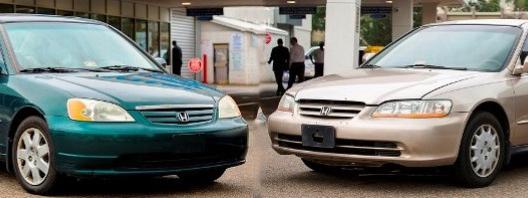















NHTSA confirms 11th U.S. fatality tied to rupture of Takata air bag inflator |
|---|
 Topics: Takata, Honda Civic
Topics: Takata, Honda Civic
|
National Highway Traffic Safety Administration
20 October 2016
The National Highway Traffic Safety Administration has confirmed that a crash fatality in Riverside County, Calif., is tied to a rupture of a recalled Takata air bag inflator. The victim, a 50-year-old female, died after sustaining injuries in a crash on Friday, Sept. 30. NHTSA investigators have inspected the vehicle, in cooperation with local authorities.
THIS IS THE 11TH CONFIRMED U.S. FATALITY TIED TO RUPTURES OF TAKATA AIR BAG INFLATORS.
The victim was driving a 2001 Honda Civic. The vehicle was first recalled in 2008, and records show that the recall repair was never completed
The vehicle is included in a population of Honda and Acura vehicles which has been identified by NHTSA as holding “substantially higher risk.” The air bag inflators in these particular vehicles contain a manufacturing defect which greatly increases the potential for dangerous rupture when a crash causes the air bag to deploy. Ruptures are far more likely in inflators in vehicles that have spent significant periods of time in areas of high absolute humidity — particularly Florida, Texas, other parts of the Gulf Coast, and Southern California. Testing of the inflators from these vehicles show rupture rates as high as 50 percent in a laboratory setting.
The Department of Transportation continues to ask for the news media and public’s assistance to find the remaining unrepaired vehicles. Drivers of these vehicles should immediately visit SaferCar.gov to check whether their vehicle has any outstanding safety recalls. Those that do should contact their nearest dealer to schedule a no-cost immediate repair. Replacement parts for these vehicles are available immediately.
The higher-risk inflators are in the following 2001-2003 Honda and Acura vehicles:

NHTSA and the Independent Monitor of Takata and the Coordinated Remedy Program are exercising aggressive oversight of the recall of these vehicles. In June, the Department of Transportation told vehicle owners to not drive the vehicles unless directly to a dealer to have them repaired. Honda reports there are just under 300,000 vehicles in the population not yet repaired or accounted for.
BACKGROUND ON THE TAKATA RECALLS: Nearly 70 million Takata air bag inflators are or will be under recall by 2019, in the largest and most complex auto safety recall in U.S. history. A combination of time, environmental moisture and fluctuating high temperatures contributes to the degradation of the ammonium nitrate propellant in the inflators. Such degradation can cause the propellant to burn too quickly, rupturing the inflator module and sending shrapnel through the air bag and into the vehicle occupants. More information.
More information on the higher risk inflators.
NOTE TO MEDIA: NHTSA encourages media coverage of this event in an effort to increase public awareness of the urgency of getting recalled Takata air bag inflators replaced. Car owners should visit www.safercar.gov to check the recall status of their vehicles and for more information on what the recall means to them.
